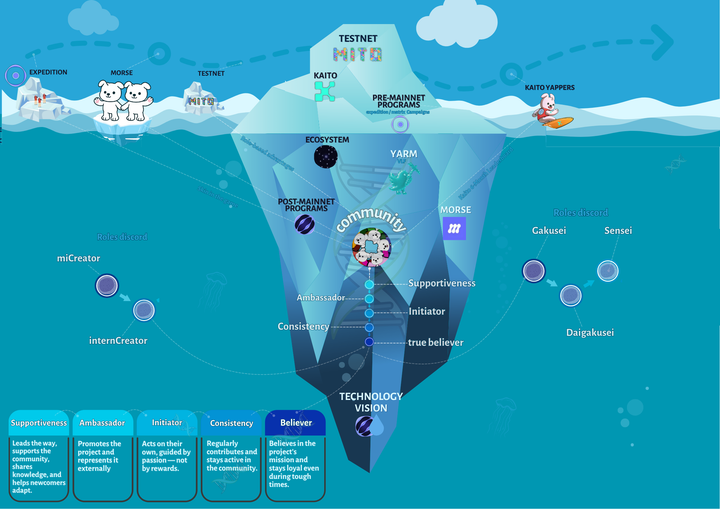The Silent Engineer: What Movement Labs’ CTO Didn't Say — and Why It Matters

In Web3, founders often get the spotlight but in the fallout of Movement Labs’ scandal, the CTO's silence speaks volumes. This article will analyze the role (and responsibility) of the technical leadership during the token mismanagement and forged agreement saga.
Introduction
In the wake of the Movement Labs fallout, the headlines fixated on the alleged forgery, the token misallocation, and the founder’s compromised ethics. But as the dust began to settle, a curious absence became more noticeable: the silence of the CTO.
In Web3, where decentralization and transparency are core values, the responsibility of leadership doesn’t end with flashy announcements or technical releases. It extends to accountability especially in moments of crisis.
The Movement Labs scandal wasn’t just a case of miscommunication or mismanagement; it was a breach of community trust at a foundational level. And while founders often bear the brunt of public scrutiny, the technical leadership the ones who build the systems, approve the flows, and secure the assets are equally accountable.
The CTO’s Role in a Crypto Startup
In any startup, the Chief Technology Officer (CTO) is the architect behind the curtain. But in Web3, that role carries even more weight. It’s not just about building robust code or managing development cycles, it's about trust engineering.
A CTO in a crypto project wears many hats:
- Overseer of smart contract integrity
- Guardian of security architecture
- Gatekeeper for tokenomics logic
- Translator between the technical and the non-technical worlds
In Web3, where the tech is the product, the CTO isn’t just a co-founder, they're a co-author of trust.
More than just lines of Solidity or backend flows, CTOs shape how tokens move, who can access what, and how users interact with value. A single overlooked function, a misconfigured wallet, or an unsigned multisig can mean millions lost not just in funds, but in faith.
In that light, when a project like Movement collapses under the weight of forgery and financial misconduct, the absence of the CTO’s voice isn’t just silence, it’s a signal.

Where Was the CTO During the Collapse?
As the Movement Labs scandal unraveled centered around forged documents, questionable investor relations, and token fund mismanagement the community scrambled for answers. One voice, however, remained absent throughout: the CTO's.
There were no statements, no tweets, no clarifications from the technical lead. In a space where community confidence is everything, this silence was deafening.
Was the CTO unaware of the forged SAFEs and investor misrepresentation?
Did they have visibility into how funds were moved or how decisions were made?
Or was it simply easier and safer to detach from the storm and let the founder face it all?
In fairness, many developers in the crypto space prefer to stay low-profile, focusing on code while founders take the front stage. But when the foundation of a project collapses, technical leadership is not exempt from accountability. Their silence risks being interpreted not as neutrality, but as complicity.
Especially when you're in charge of building the rails others are investing on, absence is a position.
Shared Responsibility in Decentralized Teams
One of the core ideals of Web3 is decentralization shared power, distributed trust, and collaborative governance. But ironically, when scandals erupt, responsibility often centralizes around a single scapegoat, usually the public-facing founder.
This is where the model breaks.
In a decentralized project, no single person should carry all the blame or all the praise. That includes the CTO. They are not just a "technical executor" they are a stakeholder in the project’s ethics, strategy, and public narrative.
A truly decentralized team needs:
- Transparent decision-making between founders and engineers
- Shared access to wallets, tools, and documentation
- Checks and balances, especially when it comes to managing investor funds or token allocations
- Internal accountability systems: red flags shouldn't need to go public before they're addressed
Silence, in these environments, creates power vacuums. And in crypto, power vacuums get exploited quickly.
The CTO doesn’t just build the system; they help shape how that system is governed. When that voice is missing in moments of collapse, decentralization becomes a slogan, not a practice.
Lessons for the Next Generation of CTOs which shouldn't be ignored
The Movement Labs event is a cautionary tale but also an opportunity. It highlights a crucial shift happening in Web3: CTOs can no longer afford to be “just builders.” The complexity of decentralized systems now demands both technical brilliance and ethical presence.
Here are a few principles that the next wave of crypto CTOs should embrace:
1. Transparency is Technical Debt You Can’t Ignore
Just like bad code compounds over time, so does poor communication. CTOs should be vocal about the systems they build, the risks they see, and the decisions they oppose. Silence isn't neutrality, it's a failure mode.
2. Speak When Structures Fail
Being a leader means stepping forward when something goes wrong. If founders are acting unethically or misrepresenting the project, technical leads must raise the alarm internally first, publicly if necessary.
3. Architect for Accountability
CTOs should build systems that prevent unilateral decisions in multisig wallets, audit logs, permission thresholds. Code can enforce transparency just as well as a public statement.
4. Balance Vision with Vigilance
It’s easy to fall in love with the innovation. But the best CTOs learn to balance that with defensive engineering, protecting both users and the project from internal abuse.
5. Own Your Role in the Narrative
In Web3, every line of code is a line in the project’s story. CTOs are co-authors of that story, whether they claim it or not.
When Builders Go Quiet, Trust Breaks
The Movement Labs fallout is more than a scandal — it’s a structural warning. It reminds us that in crypto, technical leadership is moral leadership. When tokens are lost, communities betrayed, and documents forged, the silence of the builder is not just absence it’s negligence.
We often celebrate CTOs for their brilliance, their speed, their ability to ship. But in a trustless world, what matters just as much is their courage to speak up, slow down, and stand firm when integrity is on the line.
The next era of Web3 doesn’t just need better tools.
It needs stronger technical stewards builders who protect the code and the community.
Because when the tech fails, we look to the people behind it.
And when the people disappear, the trust goes with them.



Comments ()